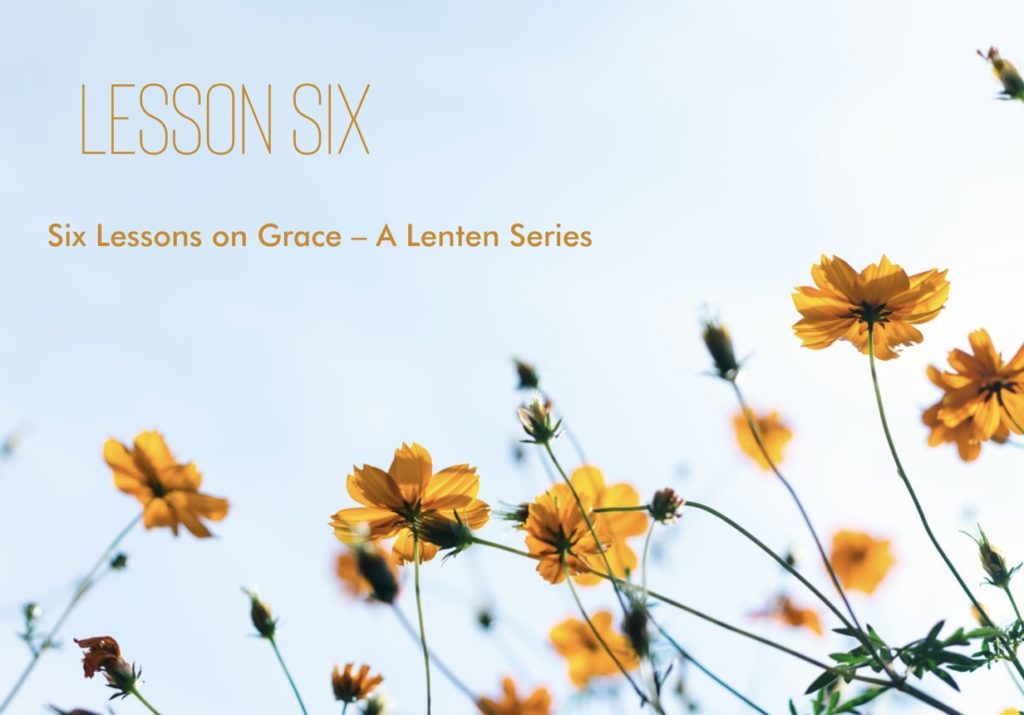
On this Tuesday before Holy Week, we will consider the sixth and final way we experience God’s amazing grace – grace that ultimately transforms us. This is the outcome of the last five weeks where we looked at how:• grace is convicting, and without it we are hopeless• grace is undeserved, and without it we are deceived• grace is unjust, and without it we remain in bondage• grace is compelling, and without it we are lost• grace is levelling, and without it we remain divided.
We’ve made the claim that experiencing God’s grace never leaves us unchanged. Its power begins by convicting us of sin, moves us to repentance, then sets us free to love our neighbor and live in unity in the body of Christ.
All of this amazing work is dependent upon our encounter with God’s grace, and not our dalliance with its counterfeit variants. Just as God delights in seeing his children transformed by grace, the enemy relishes in every opportunity to deceive us into accepting a feeble and lifeless alternative. Dressed up like grace, these insipid offerings look like the real thing, but lead us back to a form of grace that satisfies our ego but stagnates our spirit.
Dietrich Bonhoeffer called this deception ‘cheap grace’.
“Cheap grace means grace sold on the market like cheapjacks’ wares. The sacraments, the forgiveness of sin, and the consolations of religion are thrown away at cut prices. Grace is represented as the Church’s inexhaustible treasury, from which she showers blessings with generous hands, without asking questions or fixing limits. Grace without price; grace without cost!” (The Cost of Discipleship)
The Apostle Paul said it this way, “What shall we say, then? Shall we go on sinning so that grace may increase? By no means! We are those who have died to sin; how can we live in it any longer? (Romans 6:1-2)
How indeed? But that’s just the problem. Fake grace is the church’s response when it seeks to survive in an increasingly hostile culture. When you live in a world that hates grace in its true form, you can either stand firm and preach the truth, or substitute true grace for a sickly enough version to appease the culture. Bonhoeffer describes what that looks like.
“Cheap grace is the preaching of forgiveness without requiring repentance, baptism without church discipline, Communion without confession, absolution without personal confession. Cheap grace is grace without discipleship, grace without the cross, grace without Jesus Christ, living and incarnate.”
The death of the voice and influence of the church in America comes directly from our compromise in the preaching of grace. Cheap grace comforts but does not satisfy. It appeases our critics while stripping the gospel of its power to transform. It presents the world with a nicer, softer, more palatable religion that looks less and less like anything connected with Jesus and his message of the coming of the kingdom of God.
In this Lenten season, we must name this ‘cheapjack ware’ for what it is and return to the true gospel and its teaching of grace. How will we know the real thing from the counterfeit? God’s grace alwaysbrings us to crisis, sends us to our knees, humbles us in our sin, convicts us in our pride, uncovers our cowardice, exposes our greed and draws from our lips the confession, “Naked, come to Thee for dress; Helpless, look to Thee for grace; Foul, I to the fountain fly;Wash me, Savior, or I die.” (Rock of Ages)
This is the grace that has the power to transform because it is grace that is costly. Bonhoeffer went on to describe this grace.
“Costly grace is the treasure hidden in the field; for the sake of it a man will go and sell all that he has. It is the pearl of great price to buy which the merchant will sell all his goods. It is the kingly rule of Christ, for whose sake a man will pluck out the eye which causes him to stumble; it is the call of Jesus Christ at which the disciple leaves his nets and follows him. Costly grace is the gospel which must be sought again and again, the gift which must be asked for, the door at which a man must knock.”
As we prepare to enter Holy Week, will we stand at the door and knock, asking for God to overwhelm our spirit with his Holy Spirit? Will we seek this grace again and again, knowing that in it we have eternal life? Will we sell everything we have, surrender all of our life to him in order for that grace to have rule in our hearts?
I will let Bonhoeffer have the final word in this series on grace. May it bless and challenge you as you steward God’s grace as you enter into Holy Week and throughout your days.
“Such grace is costly because it calls us to follow, and it is grace because it calls us to follow Jesus Christ. It is costly because it costs a man his life, and it is grace because it gives a man the only true life. It is costly because it condemns sin, and grace because it justifies the sinner. Above all, it is costly because it cost God the life of his Son: “ye were bought at a price,” and what has cost God much cannot be cheap for us. Above all, it is grace because God did not reckon his Son too dear a price to pay for our life but delivered him up for us. Costly grace is the Incarnation of God.
Connect With Us
Connect with us and others in The Center for Steward Leader Studies community to stay informed on activities and opportunities.
